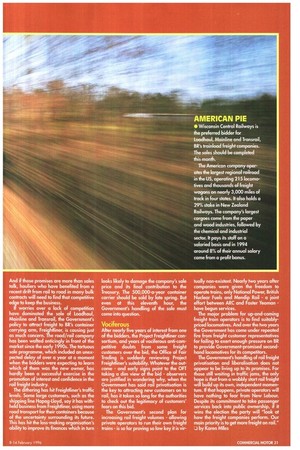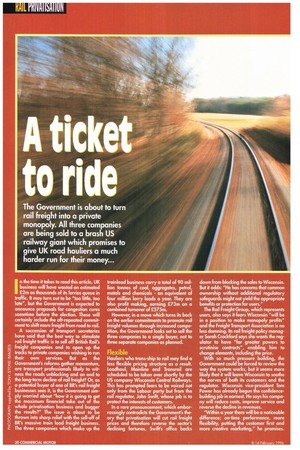AMERICAN PIE The Government is about to turn rail freight
Page 33

Page 32

If you've noticed an error in this article please click here to report it so we can fix it.
into a private monopoly. All three companies are being sold to a brash US railway giant which promises to give UK road hauliers a much harder run for their money...
• Wisconsin Central Railways is the preferred bidder for Loodhaul, Mainline and Transrail, BR's trainload freight companies. The sales should be completed this month.
The American company operates the largest regional railroad in the US, operating 215 locomotives and thousands of freight wagons on nearly 3,000 miles of track in four states. It also holds a 29% stake in New Zealand Railways. The company's largest cargoes come from the paper and wood industries, followed by the chemical and industrial sector. It pays its staff on a salaried basis and in 1994 around 8% of their annual salary came from a profit bonus.
In the time it takes to read this article, UK business will have wasted an estimated Om as thousands of its lorries queue in traffic. It may turn out to be "too Rifle, too late", but the Government is expected to announce proposals for congestion cures sometime before the election. These will certainly include the oft-repeated commitment to shift more freight from road to rail.
A succession of transport secretaries have said that the best way to stimulate rail freight traffic is to sell off British Rail's freight companies and to open up the tracks to private companies wishing to run their own services. But as the Government's reforms gather momentum, are transport professionals likely to witness the roads unblocking and an end to the long-term decline of rail freight? Or, as a potential buyer of one of BR's rail freight businesses sees it, is the Government simply worried about "how it is going to get the maximum financial take out of the whole privatisation business and bugger the results?" The issue is about to be thrown into sharp relief with the sell-off of BR's massive train load freight business. The three companies which make up the trainload business carry a total of 90 million tonnes of coal, aggregates, petrol, metals and chemicals an equivalent of four million lorry loads a year. They are also profit making, earning £73m on a combined turnover of £575m.
However, in a move which turns its back on the earlier commitments to promote rail freight volumes through increased competition, the Government looks set to sell the three companies to a single buyer, not to three separate companies as planned.
Flexible
Hauliers who trans-ship to rail may find a less flexible pricing structure as a result. Loadhaul, Mainline and Transrail are scheduled to be taken over shortly by the US company Wisconsin Central Railways. This has prompted fears to be voiced not only from the Labour party but from the rail regulator, John Swift, whose job is to protect the interests of customers.
In a rare pronouncement, which embarrassingly contradicts the Government's theory that privatisation will cut rail freight prices and therefore reverse the sector's declining fortunes, Swift's office backs down from blocking the sales to Wisconsin. But it adds: "He has concerns that common ownership without additional regulatory safeguards might not yield the appropriate benefits or protection for users."
The Rail Freight Group, which represents users, also says it fears Wisconsin "will be in a position to make monopoly profits" and the Freight Transport Association is no less damning. Its rail freight policy manager Sarah Crockford says she wants the regulator to have "far greater powers to scrutinise contracts", enabling him to change elements, including the price. With so much pressure building, the Government could be forced to review the way the system works, but it seems more likely that it will leave Wisconsin to soothe the nerves of both its customers and the regulator. Wisconsin vice-president Tom Power has already begun the confidencebuilding job in earnest. He says his company will reduce costs, improve service and reverse the decline in revenues.
"Within a year there will be a noticeable difference; on-time performance, more flexibility, putting the customer first and more creative marketing," he promises. And if those promises are more than sales talk, hauliers who have benefited from a recent drift from rail to road in many bulk contracts will need to find that competitive edge to keep the business.
If worries over a lack of competition have dominated the sale of Loadhaul, Mainline and Transrail, the Government's policy to attract freight to BR's container carrying arm, Freightliner, is causing just as much concern. The road/rail company has been wafted enticingly in front of the market since the early 19905. The tortuous sale programme, which included an unexpected delay of over a year at a moment when the bidders were expecting to learn which of them was the new owner, has hardly been a successful exercise in the promotion of interest and confidence in the rail freight industry.
The dithering has hit Freightliner's traffic levels. Some large customers, such as the shipping line Hapag-Lloyd, say it has withheld business from Freightliner, using more road transport for their containers because of the uncertainty surrounding its future. This has hit the loss-making organisation's ability to improve its finances which in turn
looks likely to damage the company's sale price and its final contribution to the Treasury. The 500,000-a-year container carrier should be sold by late spring. But even at this eleventh hour, the Government's handling of the sale must come into question.
Vociferous
After nearly five years of interest from one of the bidders, the Project Freightliner consortium, and years of vociferous anti-competitive doubts from some freight customers over the bid, the Office of Fair Trading is suddenly reviewing Project Freightliner's suitability. Whatever the outcome and early signs point to the OFT taking a dim view of the bid observers are justified in wondering why, when the Government has said rail privatisation is the key to attracting new customers on to rail, has it taken so long for the authorities to check out the legitimacy of customers' fears on this bid.
The Government's second plan for increasing rail freight volumes allowing private operators to run their own freight trains is so far proving so low key it is vir
tually non-existent. Nearly two years after companies were given the freedom to operate trains, only National Power, British Nuclear Fuels and Mendip Rail a joint effort between ARC and Foster Yeoman have begun services.
The major problem for up-and-coming freight train operators is to find suitably. priced locomotives. And over the two years the Government has come under repeated fire from freight customer representatives for failing to exert enough pressure on BR to provide Government-promised secondhand locomotives for its competitors.
The Government's handling of rail freight privatisation and liberalisation does not appear to be living up to its promises. For those still waiting in traffic jams, the only hope is that From a wobbly start rail freight will build up its own, independent momentum. If that happens, private operators will have nothing to fear from New Labour. Despite its commitment to take passenger services back into public ownership, if it wins the election the party will "look at how the freight companies perform. Our main priority is to get more freight on rail."
by Karen Mlles




































































































